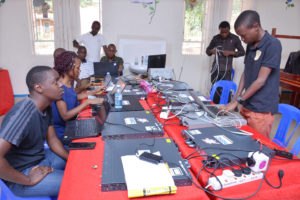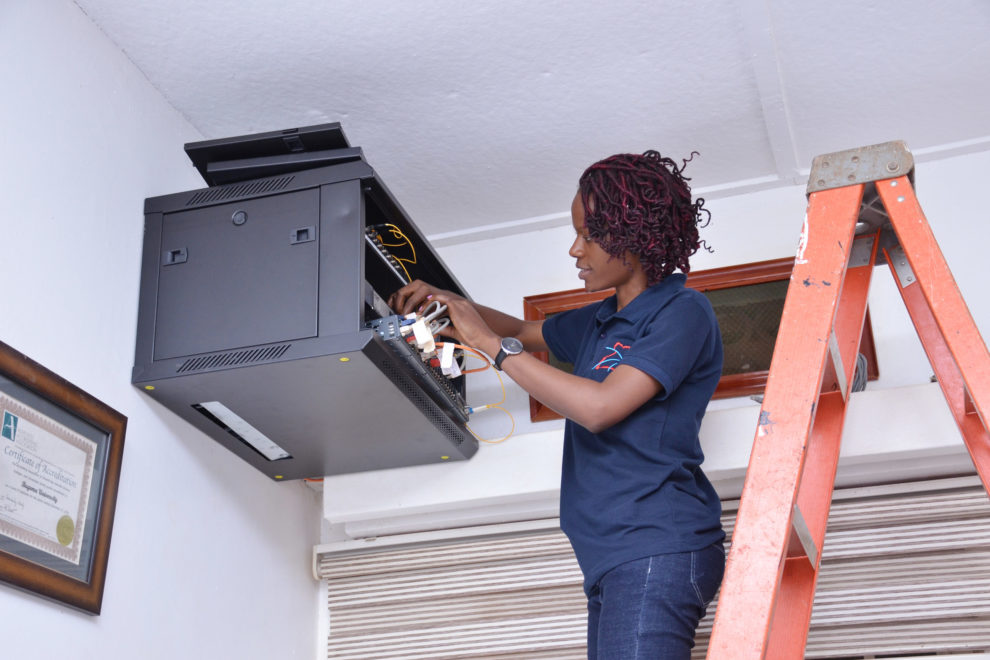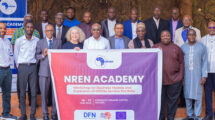The Research and Education Network of Uganda (RENU) began the rollout of metro eduroam in 2020. Since then, RENU has successfully deployed over 500 hotspots in across the country to the benefit of students and staff via connecting 61 Educational institutions from 42 service locations. Such exceptional progress cannot go unnoticed. We caught up with the Systems and Software Engineer at RENU, Hellen Nakawungu, to get insight into how RENU has managed to be this successful in the deployment of eduroam. Here is what Hellen had to say about the initiative in her interview.
Hellen, you are part of the team at RENU that planned and deployed Metro eduroam in Uganda. Just recently, RENU celebrated the extension of the initiative upcountry with not only visible progress in the usage, but also an increase in the number of eduroam hotspots serving off-campus connectivity needs, which are now over 400. How did this initiative come to life?
We had the idea of deploying eduroam outside of campus boundaries two years before COVID-19. We approached various service providers and pitched the idea of running the eduroam service over their infrastructure (because there are no RENU-connected access points in the metropolis). It didn’t make business sense for the service providers, however, because it was limited to a small group of people who were primarily located in campus environments outside of the general metropolitan area, and the technicalities of deploying it through their infrastructure were abstract to them.
When COVID struck, educational and research institutions closed, disrupting academic activities across the country. This provided an opportunity to investigate the concept of learning and researching beyond campus boundaries as a means of responding to the pandemic as a national research and education network. Because of this opportunity, the initial idea we pitched became more relevant and useful to the broader academic community, and subsequently to the service providers.
What technology does Metro eduroam run on? In a nutshell, how does it work?
For authentication over the eduroam SSID, it uses a RENU-operated RADIUS proxy server that is configured in the service providers’ access points. The RADIUS proxy forwards authentication requests to RENU’s national Federation-Level RADIUS (FLR) server.

What were the main challenges that you and your team encountered in the roll out of Metro eduroam?
Educating service providers on eduroam configuration. Because most of them were only familiar with the captive portal and WPA-PSK configurations, getting the APs to communicate with the radius server proved difficult due to the fact that different SPs have different infrastructure designs.
Second, in one configuration, we wanted the radius authentication to happen internally rather than through the IXP, but the service provider’s design prevented this from happening. Most service providers used private IP addresses for their access points, which hampered location tracking and usage. Although the RADIUS proxy was located on the RENU network and thus considered “external,” service providers were unwilling to expose their access points to communicate with external hosts outside their network. In addition, some service providers who already provided public wireless service saw metro eduroam as a threat.
Can you tell us about a highlight of your experience working on this initiative?
The fact that we were pushing eduroam to unexpected locations, I mean outside of institutional limits! To me, this was simply amazing!
Despite the incredible progress made in the past two years with Metro eduroam, the current number of users is still low compared to the overall population of students, researchers and academic staff in the country. Are there any plans in motion to expand the initiative to even more areas in the near future?
Yes, we would like to see an increase in the number of eduroam hotspots in strategic locations that have an impact on the target users. As we speak, we are extending the eduroam service to other districts (that is, in common areas outside our member institutions’ campus boundaries), and we also have a program of extending eduroam to schools – where we are donating at least 2(two) access points per school – thanks to the Internet Society Foundation through the Bolt grant program – who have supported us in making this dream a reality.
In your Lightning Talk at TNC22, you call the global NREN community reunited in Trieste to accelerate the deployment of eduroam hotspots across the world. As off-campus connectivity has proved to be crucial for all higher education and research institutions – now more than ever with the switch to online learning – what do you think it would take to expand Metro eduroam to other continents?
Other NRENs could use the RENU script and engage infrastructure service providers to help them understand the value of NRENs and eduroam in the education and research eco-system.
You are a female engineer in a predominantly male-dominated field, telecommunications infrastructure. What does it mean to you to be at the forefront of the Metro eduroam initiative as a woman in STEM?
It’s not so much about gender as it is about the goal, which is to enable research and education collaboration through eduroam. The Metro eduroam project is one way the NREN is attempting to broaden its initiative to enable collaboration and research anywhere, regardless of the location of the researcher or student. Leading such a project, regardless of gender, necessitates a passionate but also goal-oriented leader. RENU’s status as an equal opportunity employer helps even more. Anything is possible as long as one has the ability!
What RENU has done and continues to do is nothing short of impressive. It deserves recognition not only at the national level but also at the regional level as it serves as a great example of how eduroam can be successfully deployed in an African country. Hellen assured our team that RENU has even more in store regarding eduroam and concluded with a challenging “watch the space”.





